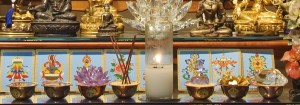The following is an excerpt from a teaching by Jetsunma Ahkon Lhamo called “Take Control of Your Life”
On the Vajrayana Path, the teacher will say, “I will beat you to death if you don’t straighten up. I will just take a stick to you.” You know, His Holiness [Penor Rinpoche] is famous for doing that. He once had a Tulku who was dying and this Tulku was someone that His Holiness had a lot of hopes in. Obviously there was some obstacle to his life. What was it? We don’t know. But His Holiness realized the Tulku was dying. So he went in to see the Tulku, and the Tulku must have said something that brought up His Holiness’ awareness of this obstacle. His Holiness took off his mala and starting beating him with his mala, just beating him and beating him. And the next day, the Tulku was completely well.
Sometimes the lamas are wrathful in order to remove obstacles. Sometimes the lamas are so wrathful that they are more wrathful than any parent we’ve ever had and we see that. Or we love the lama so much that the wrathfulness of the lama seems like a big stick and we can hardly bear it. Or the disappointment of our lama seems like a big stick and we can hardly bear that. Then sometimes the lama says, “You are such a special being. You are so intrinsically special, even your karma is special. You are special to me. I love you so much. Come here. Come on.” And the lama says, “I love you.” And the lama says, “I know you.” And the lama says, “I see your heart. Feel that?” And the lama says, “I have great gifts to give you. Dharma is beautiful. It’s a joy to practice. It’s everything the Buddha has offered. I’ll set this immense banquet in front of you and you can eat the food of Dharma. How beautiful.”
Of course the lama neglects to mention that Dharma is difficult, that the path is hard, that the things that we have to face about ourselves are horrible and ugly and the things that we have to change about ourselves are very hard work. It’s very hard to change that ego-cherishing into pure generosity and bodhichitta. It’s so hard. The lama may invite you to have some tea. But if you have real potential, the lama’s going to smack you upside the head and say, “Straighten out, buddy. That’s not the way to practice Dharma.” And that’s the part that we should be grateful for. Not only should we not get mad because that would be a big mistake; but instead we should say, this is the very nectar of the Buddha’s teachings. The Buddha has instructed us how to ‘wake-up’ and now we must do the work of waking up. When we practice Dharma, Dharma is something that we practice 7 days a week, 24 hours a day, 365 days a year. There’s no Sunday in Dharma. We’re just practicing the habits of our culture [having teachings on Sunday] and we know that you work. Otherwise, there’s no Sunday in Dharma. Dharma is every day. We shouldn’t come here to see an altar; there should be an altar in our homes. To come here and practice is wonderful. We welcome you with open hearts and open arms; but this should not be the only place you practice. You should maintain your practice every day.
This is the way to be happy. Because if you create the habit of practicing and doing some Dharma, making prayers and offerings, practicing say, Ngöndro every day, or even just reciting Seven Line Prayer every day, the mind begins to change. It’s less inflamed, less needy, less concerned with what you want, less concerned with bad habits. The mind begins to change in such a way that it’s less inflamed, more relaxed. And a more relaxed and spacious mind is the prescription for a more joyful mind.
